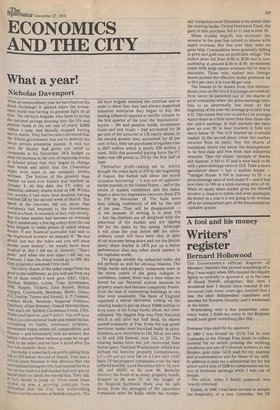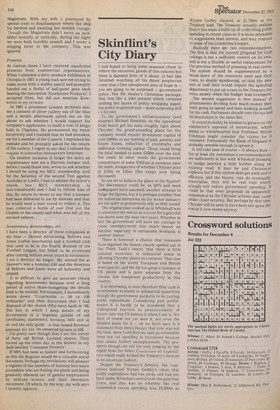What a year!
Nicholas Davenport
What an extraordinary year we have had on the Stock Exchange! It opened when the investTent world was having its greatest fight of all time. The old boys brigade, who have to invest the national savings pouring into the life and Pension funds at the net rate of nearly £3000 million a year, had literally stopped buying equity shares. They had become convinced that the Wilson government was out to destroy the Whole private enterprise system. It was not until Mr Healey had given tax relief to companies in his November 1974 budget to Meet the increase in the cost of replacing stocks at inflated prices that they began to change their minds and admit that the Chancellor Might even want to see company profits increase. The bottom of the greatest bear market we have ever known was reached on January 6. At this date the FT index of industrial ordinary shares stood at 146. Within tv:/0 months it had more than doubled, having reached 320 by the second week of March. The sPeed of the recovery did not mean that confidence had returned to the investment World in a flash. It returned, in fact, very slowly. But the bear market had become so oversold that it needed only a few big orders from the old boys brigade to make prices of select shares double. If any financial journalist had said to the frightened investor on January 6: "Be not afraid; just buy the index and you will soon double your money", he would have been laughed at. But 1 did say in January: "Don't Panic" and when the turn came I did say on February 1 that the index would go to 350. My then proprietor assumed I was mad.
The thirty shares of the index range from the good to the indifferent, as you will see from the list of them which I now give: GEC, GKN, Hawker Siddeley, Lucas, Tube Investment, EMI, Plessey, Vickers, John Brown, British Oxygen, Courtaulds, Beecham, Boots, Glaxo, ICI, Dunlop, Turner and Newall, A. P. Cement, London Brick, Bowater, Imperial Tobacco, Distillers, Allied Brewery, Grand Metropolitan, Tate and Lyle, Spillers, Cavenham Foods, UDS, Marks and Spencer, and P and O. You will note that it is a conventional trade and industrial list, containing no banks, insurance, property, Investment trusts, mines, oil, commodities, and finance — and fortunately now no motors. But before I discuss these various groups let us get back to the index and see how it fared after the first two months' dizzy rise.
Inevitably it came back on profit-taking from 320 to 270 before the end of March. This was a Fritical point because it was obvious that the institutional managers who had missed the first bus on the road to a bull market had now got an 9PPortunity to catch the second bus. They did, In fact, decide to jump on. What made them crowd on was a growing criticism from Whitehall that the City was withholding finance for the recovery of British industry. The
old boys brigade resented the criticism and in order to show that they had always supported industrial enterprise they began to buy the leading industrial equities in terrific volume. In the first quarter of the year the 'institutional' buyers — life and pension funds, investment trusts and unit trusts — had accounted for 39 per cent of the turnover in UK equity shares. In the second quarter they accounted for 42 per cent; in fact, their net purchases of equities rose to £637 million which is nearly £50 million a week. With this powerful buying force the FT index rose 100 points to 375 by the first half of June.
Thereafter profit-taking set in, which brought the index back to 278 by the beginning of August. But bullish talk about the world recession 'bottoming' — it was not all apparent except possibly in the United States — led to the return of market confidence and the index began a slow but impressive recovery from 278 to 378' by November 19. The bulls were then talking confidently of 400 by the end of the year. They will be disappointed — at the moment of writing it is near 370 — but the chartists are all delighted with the behaviour of the market and are tipping 520 for the index by the spring. Although it will close the year below 400 the extraordinary result will have been that in spite of our economy being down and out the British equity share market in 1975 put up a better performance than any other stock market in the capitalist world.
The groups outside the industrial index did not perform so well for obvious reasons. The fringe banks and property companies were at the storm centre of the great collapse in confidence. Indeed, there was a time when we feared for our financial system because its property assets had become completely frozen. Even the best of commercial buildings at one time were unsaleable. The Bank of England organised a rescue operation, calling on the clearing banks to put up about £1000 million to keep some of the fringe banks afloat, but most collapsed. The biggest flop was First National which is still alive but half dead, its shares quoted nominally at 11/2p. Even the top grade merchant banks were knocked badly in price. Hambros, now recovered to 185, fell at one time to 58 and Hill Samuel, now 112, to 23. The clearing banks have not yet recovered their former glory. National Westminster, which had perhaps the heaviest property commitments, fell to 88 and are now 240 on a 5 per cent yield basis. Of the property companies even the best suffered horribly. Land Securities fell to 79, now 160, and MEPC to 53, now 68. Berkeley Hambro, the fount of so many property bonds, dropped to 50, now 73. At the height of the financial hurricane there was no safe haven. Even the strongest of life assurance -companies were hit badly while the 'compo
site' companies were flattened even worse than the clearing banks. United Dominion Trust, the giant in hire purchase, fell to 11 and is now 16.
When trouble engulfs the economy the investor in the past has turned to shares with assets overseas. But this year they were no great help. Commodities were generally falling in price and gold was no profitable refuge. The bullion price fell from $185 to $129 and is now stabilising at around $138 to $140. Investment trusts with large assets overseas fell to heavy discounts. Those who rushed into foreign shares pushed the effective dollar premium up to 911/4 per cent; it is now 66 per cent.
The lessons to be drawn from this extraordinary year on the Stock Exchange are twofold. First, never be panicked out of the shares of good companies when the price-earnings ratio falls to an abnormally low level. At the beginning of the year the average p/e ratio was 4.12. This meant that you could buy an average equity share at a little more than four times the last year's earnings. In bull markets the ratio !goes up over 20: in bear markets it falls not much below 10. The 4.12 implied an oversold market. In the second place, when the market recovers from its panic, buy the shares of companies where you know the management to be first-class and free from bad industrial relations. Take the classic example of Marks and Spencer. It fell to 47 and is now back to 95 with a price-earnings ratio of 15.6. Take a more speculative share — but a market leader — -rrafalgar House. It fell in January to 23 — a price-earnings ratio of well under 3 — and it has now risen to 108 on a price-earning ratio of 10, When an equity share market gives the shrewd': investor a chance to treble and even quintuple his money in a year it is not going to be written off as an unimportant part of the free enterprise capitalist system.
Magistrate. With my wife I journeyed by special train to Southampton where the ship lay berthed and awaiting her maiden voyage. Though the Magistrate didn't move an inch, either laterally or vertically, during the night we were both horribly seasick and I wrote a stinging letter to the company. This was ignored.
Presents
At Various times I have received unsolicited presents from commercial organisations,
When I attended a dairy produce exhibition at Olympia in 1957 a young man saw me trying to make notes with a stubby pencil and promptly handed me a fistful of ball-point pens each bearing the inscription 'Kowkreme Products'. I accepted them, but did not mention Kowkreme in my reviews.
In 1961 a prominent London architect sent me a canteen of silver cutlery out of the blue
and a month afterwards called me on the phone to ask whether I would support his company's application to build a row of bingo halls in Clapham. He pronounced my name incorrectly and I realised that he had mistaken me for a member of the Council. I explained his mistake and he promptly asked for the return of the cutlery. I regret to say that I refused his request in somewhat intemperate language.
. On another occasion (I forget the date) an acquaintance sent me a Harrods hamper and, before I could thank him, wrote to ask whether I should be using my MCC membership card for the Saturday of the second Test against Australia at Lord's. I had to admire the fellow's cheek, but MCC membership is non-transferable and I had to inform him of this. By return he wrote to say that a hamper had been delivered to me by mistake and that he would send a man round to collect it. The man collected a bottle of rose (but not the Chablis or the claret) and what was left of the smoked salmon.
Investments, directorships, etc.
I have been a director of three companies in my time — Skewer Advertising, Bellows and Jones (coffee merchants) and a football club that used to be in the fourth division of the Football League, but failed to be re-elected after coming bottom seven years in succession. I am a director no longer. My annual fee at Skewer's was a nominal £50 and the directors of Bellows and Jones were all honorary and unpaid.
It is difficult to give an accurate return regarding investments because over a long period of active share-mongering the details tend to be mislaid. Forexample, I immediately wrote down "Courtaulds — 50 to 100 ordinaries" and then discovered that I had disposed of the shares (fifty-two) back in '66. The box in which I keep details of my investments is a hopeless jumble of old certificates, statements, invoices, bills and so on and the only guide is that Inland Revenue assesses my tax on unearned income at £56.
I'm pretty sure though that I am the owner of forty old British Leyland shares. They turned up the other day in the drawer in my desk labelled `Consumer Protests'.
If MPs had been as honest and forthcoming as this the Register would be a valuable social document. Perhaps my revelations will pioneer a register of the interests of married free-lance journalists who are feeling the pinch and being gradually elbowed out of gainful employment by militant women and their liberation movement. Of which, by the way, my wife says I heartily approve.



































 Previous page
Previous page